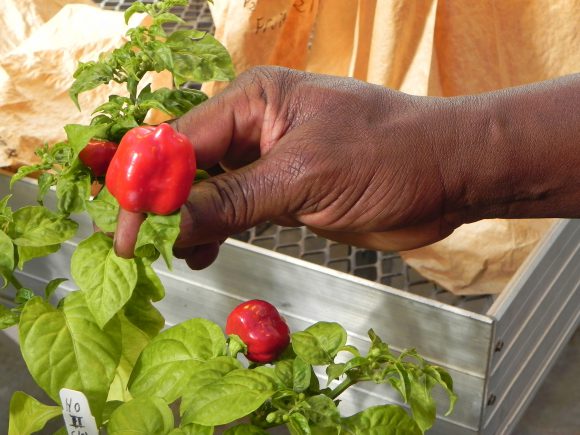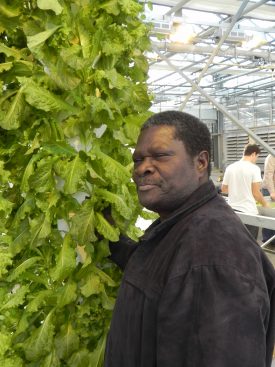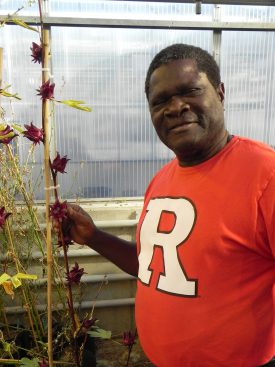
Dr. Albert Ayeni said he’s particularly excited about new sweet varieties of jalapeno peppers he and other Rutgers University researchers are developing. Photo: Richard Skelly.
Editor’s Note: This story first appeared in Mid-Atlantic Grower, an online publication of American Farm Publication, Inc.
By RICHARD SKELLY, AFP Correspondent
NEW BRUNSWICK, N.J. (March 14, 2017) — Around campus he’s known by colleagues and students as the hot pepper expert.
But Dr. Albert Ayeni wears many different hats in his role in the Department of Plant Biology at Rutgers’ School of Environmental and Biological Sciences.
“I have been working with plants all of my academic life,” he said, noting his first degree, earned in his native Nigeria, was in crop science.
His second and third degrees from Cornell University, were in weed management and agronomy.
Ayeni leads the Exotic Pepper Project at Rutgers and collaborates with other researchers every year in early September to taste test and rate various types of hot and sweet peppers.
He began research into hot and exotic peppers in 2009 working with Rutgers’ Professor Thomas Orton.
“We came together and said there is something here of interest to us. New Jersey has a significant ethnic population, so we decided looking at ethnic peppers would be a good idea. We started collecting pepper specimens then, and we started to try to determine where the most culinary interest was and since 2009, we have isolated about eight different habaneros that have the potential to be released to our growers,” Ayeni said.
“We have lined up three or four jalapeno peppers, some are sweet and others are hot, for release in 2017,” he said, adding, “the taste of most people in New Jersey is on the mild side, not on the hot side.”

Ayeni is also involved with other ethnic crop research projects on the Cook campus. Photo: Richard Skelly.
Ayeni is also involved in other projects at the Cook campus greenhouses, including aeroponic and hydroponic lettuce growing and unique ethnic crops like roselle and amaranth, the latter a warm weather substitute for spinach.
“Amaranth is a spinach-like vegetable, but spinach is grown during the cool season from November to March and April and by July it has petered out,” he said, “so this new amaranth we are developing here fills that gap between June and September when you don’t have spinach.
“We’re working on these various ethnic crops and we know there’s a market for them here in New Jersey, to appeal to the ethnic groups, and eventually, to appeal to the entire population.
“The hot pepper sauce market is growing like crazy, so the cayenne and habanero peppers we grow here are useful for the hot sauces. That market is huge.”
“If you are interested in tasting peppers the best time to come to the [Ryders Lane] Rutgers experimental gardens is in late August,” Ayeni said, noting they’ve had gatherings of hot and exotic pepper enthusiasts the last few summers at the farm on the New Brunswick/East Brunswick border.
“We invited people to come to our farm on Ryders Lane and last year we had about 75 people out there in late August,” he said, “the idea is to get the people to come out to the farm and sample some hot peppers. We don’t encourage them to taste all the hot peppers there.
“That event keeps expanding. They come and see them and take some home but you don’t have to taste them all there, it can be too dangerous,” he said, laughing. “If you take some hot peppers home make sure you have a bottle of milk or ice cream around!”
Ayeni said he remains happy dividing his time between teaching students, working in his greenhouses and delivering talks on the growing market for ethnic crops in states like New Jersey and New York.
He divides his time between lettuces, roselle, Indian, African and American okra and hot and exotic peppers.
“We know the appeal of ethnic crops is growing and we are trying to respond to that marketplace,” Ayeni said, noting he’s particularly excited about new sweet varieties of jalapeno peppers and new pumpkin habanero peppers.
Ayeni also works with bitter leaf, a crop from Africa that seems to show promise for people with diabetes by controlling blood sugar levels.
“The ethnic population is increasing. We have a responsibility at Rutgers to grow what people like and what people want,” he said. “So we’re putting more resources into specialty crops to respond to changing demographics in New Jersey.”
Ayeni grew up on a large farm in Nigeria not far from where he earned his undergraduate degree at the University of Ibadan in 1974.
“I had to work on the farm with my Dad,” he recalled of his youth, “and we grew all the crops together. I became interested in how plants grow and how they produce yields that we can use.”

Dr. Albert Ayeni. Photo: Richard Skelly.
“We grew typical African crops like yams, cassava, a lot of vegetables, okra, peppers, corn, which we called maize, sour gum, some fruits, some citrus things like mangoes. As a young man growing up, going to school, I developed significant interest in learning how crops grow, and the area that was most fascinating to me was weeds! It’s so hard to control weeds!”
“Working with weeds on the farm was laborious and back-breaking work in the hot sun,” he said, laughing.
“By the time I was finishing high school, I learned there were ways to control weeds without having to pull them all the time, and that got me interested,” he said, laughing again, “about how we can control weeds without having to bend down in the hot sun all day!”
“I learned there were chemicals that could be used to control weeds without affecting your crops. That was an area that was particularly fascinating to me, so after I got out of college I was fortunate to be accepted to Cornell University, and there I studied weed science, or how to control weeds!”
Ayeni earned his Master’s and Doctorate degrees from Cornell, in weed science/agronomy, in 1978 and 1982, respectively.
He came to Rutgers in 1995, working first at a Rutgers facility in Bridgeton.

